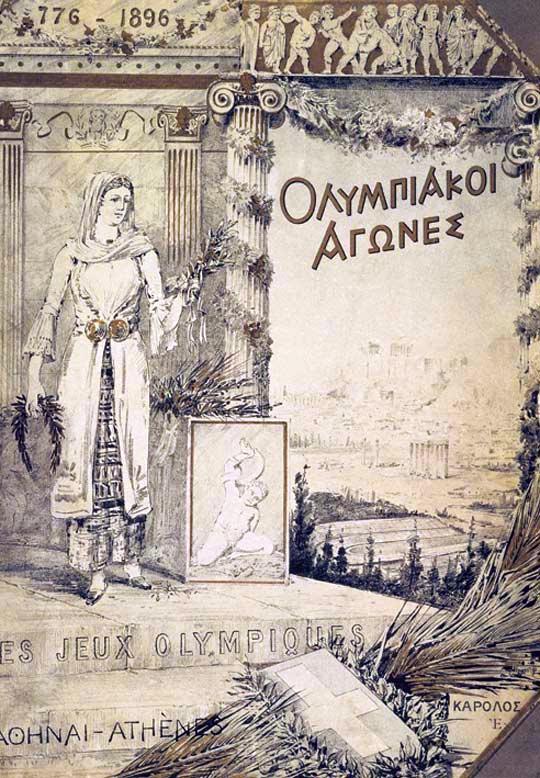
#385 Why did the Olympics restart in 1896?
Why did the Olympics restart in 1896? Frenchman Pierre de Coubertin fought to restart the Olympics because he thought they would encourage sport among amateurs, and promote peace.
The Olympic Games that was held in 1896 is often referred to as the 1st modern Olympic Games because the tradition of the games goes back at least 2,500 years. However, an Olympic Games hadn’t been held for over 1500 years.
The first ever recorded Olympic Games was held at Olympia in 776 BC. Olympia was a holy site near to the city of Elis, in Ancient Greece. The actual date is disputed, but 776 BC was the date recorded by Aristotle. It is thought that the games had been in existence for at least 500 years before the first recorded event. There were three basic ideas behind the original games. The first was to honor the gods. Olympia was a holy site, and the games were said to have been started by Zeus, king of the gods. The second was the sport itself. Ancient Greeks believed deeply in exercise and sport. Sport was heavily emphasized in Greek education. And the third reason was to have a time of peace. During the Olympics, a truce would be called and as many as 40,000 athletes and spectators from all over Greece would descend on Elis for the Olympics. The event would last three months, which meant there were at least three months of peace. The games started with a procession and each Olympic Games was named after the winner of the first running race. The very first recorded games was named after Coroebus of Elis, who was a baker and an athlete.
The games took place every four years, and the Ancient Greeks marked their calendars using the Olympics. The early games were only regional, but they began to grow until they became the most prestigious of all the sporting events held in Ancient Greece. When the Romans conquered Greece, they continued the Olympic Games for several hundred years, but the games gradually faded in popularity. The last recorded Olympic Games was in 393 AD. It is said that the Roman Emperor Theodosius I banned the games in order to suppress paganism.
During the Renaissance in Europe, in the 18th and 19th centuries, people became very interested in ancient history, especially Egyptian, Roman, and Greek. There were several sporting events named after Greek events across Europe. One example is the Wenlock Olympian Games, started by a doctor called William Penny Brookes in 1850 and held in the UK. Brookes believed very strongly in the positive effects of sport on people. He started a National Olympic Association and he campaigned throughout his entire life to have sport added to the UK school curriculum. He desperately wanted to start an international Olympic games. He managed to hold a national games in London, but he couldn’t get interest in an international games.
Brookes began to contact the Greek government with the idea of restarting the Olympic Games. In Greece, two philanthropists, Evangelos and Konstantinos Zappas had financed an Olympics within Greece. They had also paid to have the original Olympic sports stadium restored. In 1890, Brookes was visited by a French aristocrat called Charles Pierre de Fredy, Baron de Coubertin. He was deeply interested in education and the positive benefits of sports. He was taken with the idea of the Wenlock Olympian Games, and he became determined to hold an international Olympic Games. Unfortunately, Brookes died in December 1895, five months before the first Olympic Games.
It wasn’t easy or straightforward to get the Olympic Games started. Coubertin was able to use Brooke’s contacts in Greece, but most countries were far more interested in national competitions than they were in international ones. Coubertin suggested the idea of an international Olympics at a French sporting conference in 1889 and no one was interested. Coubertin spent the next six years trying to drum up support with very little success. In 1894, he organized an international athletics congress in Paris. He had to hide his real reason, the Olympics, otherwise people wouldn’t have come. By the end of the congress, he had managed to get the participants to agree on the date and the location of the first modern Olympic Games. It was to be in Athens, in April of 1896. Coubertin wasn’t sure about Greece as a location because it was going through financial turmoil at the time. In the end, Greece managed to raise the money necessary by asking for donations from all of the people in Greece.
The first games went ahead in 1896, but it wasn’t as big an event as we imagine. In fact, that and the next two Olympics were barely noticed. The Paris Olympics in 1900 was overshadowed by a World’s Fair and the 1904 Olympics in St. Louis was almost entirely American. Out of 651 athletes, only 62 athletes were non-American. From the 1908 games, they slowly gained in popularity. They were cancelled during World War 1 and held again in 1920, which goes to show that they had been taken up as an official four-year event.
So, why did the Olympic Games restart in 1896? The idea for the Olympics may have been thought up in the 1850s, but without Pierre de Coubertin, there would be no Olympics today. The first games was in 1896 because it took Coubertin that long to convince the world it would be a good idea. And this is what I learned today.
Sources:
https://www.worldhistory.org/Olympic_Games/
https://en.wikipedia.org/wiki/Coroebus_of_Elis
https://olympics.com/ioc/news/the-history-of-the-olympic-truce
https://en.wikipedia.org/wiki/Ancient_Olympic_Games
https://en.wikipedia.org/wiki/Olympia,_Greece
https://en.wikipedia.org/wiki/Elis
https://www.history.com/this-day-in-history/first-modern-olympic-games
https://en.wikipedia.org/wiki/1896_Summer_Olympics
https://en.wikipedia.org/wiki/Pierre_de_Coubertin
https://en.wikipedia.org/wiki/William_Penny_Brookes
https://olympics.com/ioc/news/the-history-of-the-olympic-truce
